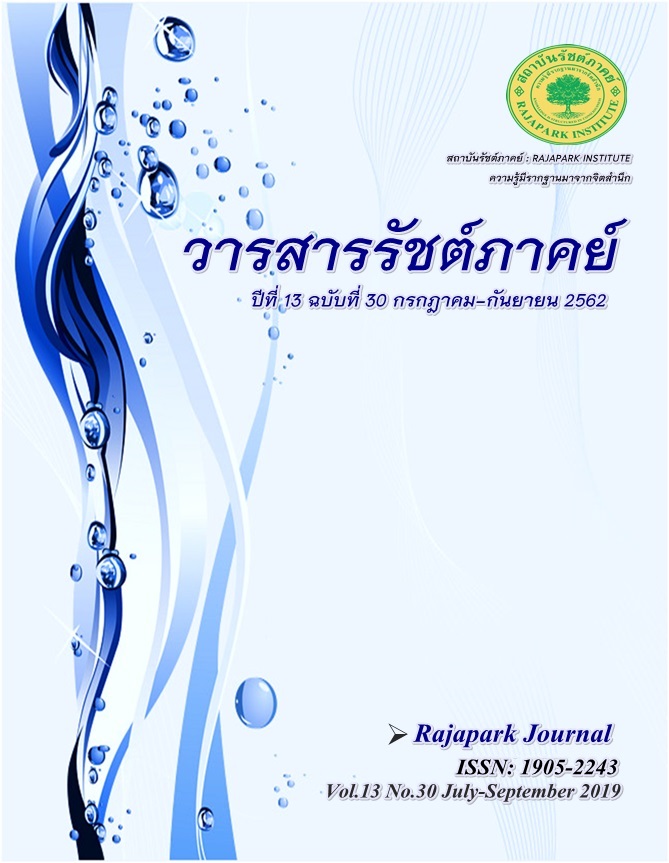The Effects of Self-Regulation Program on Assignment Completion in the Classroom of Grade 2 Students with Attention Deficit Hyperactivity Disorder
Main Article Content
Abstract
The objective of this research was to study the effectiveness of the Self-Regulation Program in assisting Grade-2 elementary students with Attention Deficit Hyperactivity Disorder (ADHD) to complete their classroom assignments. The sample group comprises 4 students with ADHD. The sample students were trained under the Self-Regulation Program 1 plan per day during 7.20 – 8.00 hrs., 3 days (Tuesday, Wednesday, Thursday) per week for 4 consecutive weeks. The data was collected in 3 stages: pre-operational stage, during operational stage and post-operational stage. The development of the students' behavior towards accomplishment of classroom assignments was analyzed from their classroom behavior scores as well as qualitative assessment of each individual student. The result of the study revealed that the 4 students with ADHD trained under the Self-Regulation Program increasingly developed the following desirable behaviors: paying attention in class, participating in class activities, and submitting assignments on time. These desirable behaviors were most apparent during the operational stage. They became less apparent in the post-operational stage and least apparent in the pre-operational stage.
Article Details

This work is licensed under a Creative Commons Attribution-NonCommercial-NoDerivatives 4.0 International License.
Views and opinions appearing in the Journal it is the responsibility of the author of the article, and does not constitute the view and responsibility of the editorial team.
References
Boriboon, G. (1999). The Norm Development of Conner's Rating Scales for the 3-17 Years School in Bangkok Metropolitan. Thesis in Educational Psychology and Guidance, Kasetsart University.
Kaewkangwan, S. (2013). Psychology of children and adults with special characteristics. Bangkok: Mor Chao Ban.
Iamsupasit, S. (2013). Theories and Techniques in Behavior Modification. Bangkok: Chulalongkorn University.
Limsuwan, N. (1999). Attention-Deficit/Hyperactivity Disorder (ADHD). Bangkok: Thammasat University.
Nakksangiam, M. (2009). The Results of Teaching English Following the Idea of Alban-Metealfe to Enhance Attention of ADHD Children. Thesis in Educational Psychology and Counseling, Khon Kaen University.
Nilkhet, P. (2007). How to teach English This is a great way to learn about new teachers. Bangkok: Aksorn Charoen Tat.
Office of Social Promotion for Learning and Quality Youth. (2012). ADHD Teacher's Guide. Bangkok: Beyond-publishing-co-ltd.
Pornnoppadol, C. (2002). Attention Deficit/Hyperactivity Disorder-ADHD Child and Adolescent Psychiatry. Bangkok: Beyond Enterprise.
Rabiner, D. (2008). Self-Regulation and Barkley’s Theory of ADHD. Retrieved July 18, 2017, from https://sharpbrains.com/blog/2008/02/23/self-regulation-and-barkleys-theory-of-adhd/
Rerkjaree, S. (2010). A Homeschool-Based Intervention Model for Thai Children with Attention-Deficit Hyperactivity Disorder. Doctor of Psychology Thesis in Counseling Psychology, Ramkhamhaeng University.
Ruviwattanapong, D. (2012). The Effect of Cognitive Behavioral Group Counseling of Self-Regulated Learning of Prathomsksa III Students. Thesis in Counseling Psychology, Burapha University.
Sankhiao, Y. (2014). Factors Related to Self-Regulated Learning by Undergraduates at the Faculty of Education, Ramkhamhaeng University. Thesis in Educational Research and Evaluation, Ramkhamhaeng University.
Skinner, B. F. (1974). About Behaviorism. New York: Alfred A. Knopf.
Utairatanakit, D., et al. (2008). KUS-SI Rating Scales: ADHD/LD/Autism (PDDs). Bangkok: Institute of Academic Development (IAD).


